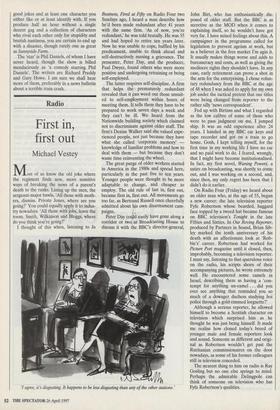Radio
First in, first out
Michael Vestey
Most of us know the old joke where the regiment finds new, more sensitive ways of breaking the news of a parent's death to the ranks. Lining up the men, the sergeant-major bawls, 'All those with moth- ers, dismiss. Private Jones, where are you going?' You could equally apply it to indus- try nowadays. 'All those with jobs, leave the room. Smith, Wilkinson and Bloggs, where do you think you're going?'
I thought of this when, listening to In Business, Fired at Fifty on Radio Four two Sundays ago, I heard a man describe how he'd been made redundant after 41 years with the same firm. 'As of now, you're redundant,' he was told brutally. He was 55 and had hoped to retire ten years later. Now he was unable to cope, baffled by his predicament, unable to think ahead and self-destructively nursing a grievance. The presenter, Peter Day, and the producer, Paul Dwyer, found others who were more positive and undergoing retraining or being self-employed.
The latter requires self-discipline. A firm that helps the prematurely redundant revealed that it an weed out those unsuit- ed to self-employment within hours of meeting them. It tells them they have to be prepared to work seven days a week and they can't be ill. We heard from the Nationwide building society which claimed not to discriminate against older staff. The firm's Denise Walker said she valued expe- rienced people, not just because they have what she called 'corporate memory' knowledge of familiar problems and how to deal with them — but because they don't waste time reinventing the wheel.
The great purge of older workers started in America in the 1980s and spread here, particularly in the past five to ten years. Younger people were thought to be more adaptable to change, and cheaper to employ. The old rule of last in, first out, became first in, first out. All movements go too far, as Bertrand Russell once cheerfully admitted about his own disarmament cam- paigns.
Peter Day cotild easily have gone along a corridor or two at Broadcasting House to discuss it with the BBC's director-general, `I agree, it's disgusting. It happens to be less disgusting than any of the other stations.' John Birt, who has enthusiastically dis- posed of older staff. But the BBC is as secretive as the MOD when it comes to explaining itself, so he wouldn't have got very far. I have mixed feelings about this. A campaigner in the programme called for legislation to prevent ageism at work, but as a believer in the free market I'm agin it. It usually makes things worse and adds to bureaucracy and costs, as well as giving the mediocre rights they shouldn't have. In any case, early retirement can prove a shot in the arm for the enterprising. I chose volun- tary redundancy from the BBC at the age of 48 when I was asked to apply for my own job under the tactical pretext that our titles were being changed from reporter to the rather silly 'news correspondent'.
Fed up with Birtism and what I regarded as the low calibre of some of those who were to pass judgment on me, I jumped ship. It was an odd experience after 24 years. I handed in my BBC car keys and tape recorder and got on a train to go home. Gosh, I kept telling myself, for the first time in my working life I have no car and no paid work to do. I feared, wrongly, that I might have become institutionalised. In fact, my first novel, Waning Powers, a satire on broadcasting, was shortly to come out, and I was working on a second, and, since then, my only regret has been that I didn't do it earlier.
On Radio Four (Friday) we heard about an older man who, at the age of 55, began a new career: the late television reporter Fyfe Robertson whose bearded, haggard face topped by a tweed hat became famous on BBC television's Tonight in the late Fifties and Sixties. In Our Roving Reporter, produced by Partners in Sound, Brian Sib- ley marked the tenth anniversary of his death with an affectionate look at 'Rob- bie's' career. Robertson had worked for Picture Post magazine until it closed, then, improbably, becoming a television reporter. I must say, listening to that querulous voice on the radio, his scripts shorn of their accompanying pictures, he wrote extremely well. He encountered some camels in Israel, describing them as having a 'con- tempt for anything un-camel . . did you ever see anything that reminded you so much of a dowager duchess studying hoi polloi through a gold-rimmed lorgnette?'
Although a serious reporter, he allowed himself to become a Scottish character on television which surprised him as he thought he was just being himself. It made me realise how cloned today's breed of younger male and female reporters look and sound. Someone as different and origi- nal as Robertson wouldn't get past the Ruritanian commissionaires on the door nowadays, as some of his former colleagues still in television conceded.
The nearest thing to him on radio is Ray Gosling but no one else springs to mind. Perhaps the admirable Delingpole can think of someone on television who has Fyfe Robertson's qualities.


































































 Previous page
Previous page